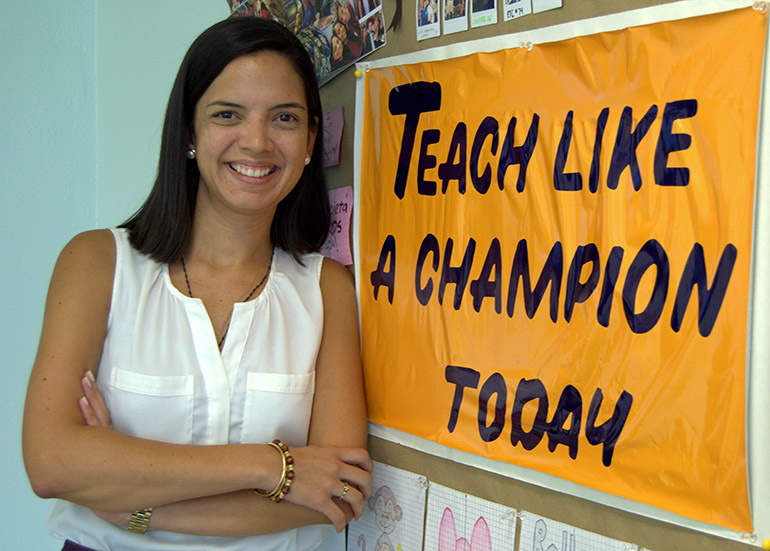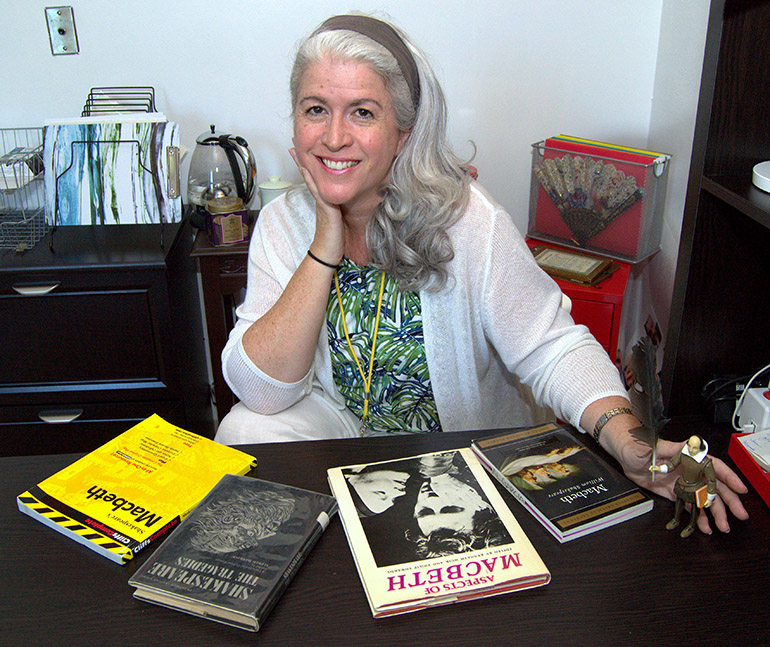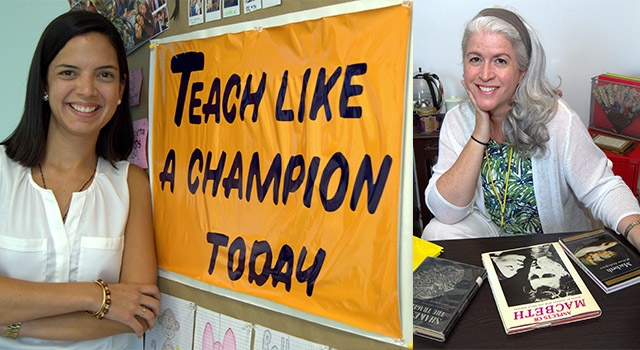By Jim Davis - Florida Catholic

Photographer: JIM DAVIS | FC
Julie Anne Cannon of Immaculata-LaSalle High School studied Finnish educational methods this summer.
MIAMI | So you think you had a busy summer?
Well, you probably did. But check out what two instructors at Immaculata-LaSalle High School did in early July.
One dug into a Shakespearean library in Washington, D.C., then learned from experts on Shakespeare in workshops and seminars.
The other instructor flew to Finland to compare educational systems, then to Italy for a conference on the future of food.
Not that either teacher at the archdiocesan school, run by Salesian Sisters, is complaining. Not when they enjoyed golden opportunities to learn larger issues, with a sweep both global and historical.
The seminar leaders "made me believe what they believed: that reading Shakespeare can strengthen and feed our own humanity," said Ana Lourdes Garcia, head of the English department at Immaculata-LaSalle.
Julie Anne Cannon, a math teacher at Immaculata-LaSalle, had her own glowing words about her summer work. "In Helsinki, they talked about making each student a 'productive member of society.' For us Catholic teachers, it's about making a student a good Christian citizen."
Read more about their shared experiences and what they brought back to pass on to their students.
Lessons from Europe: Learning, sharing, sampling elk and mozzarella
MIAMI | When Immaculata-LaSalle administrators learned about a summer study tour, they asked who would be the best teacher for it — but not for long. Not when they already had an international traveler in math teacher Julie Anne Cannon.
Born in Peru, Cannon, 30, has lived in Mexico, Venezuela and Argentina, as well as Connecticut and Florida. And she studied at the University of Notre Dame, then worked in finance in New York.
"Coming from a business background, I've always felt the need to continue learning about education," said Cannon, who traveled to two European cities July 2-10 with an organization called Education First Tours. "And coming from a different country, I always want to see what makes another country special."
Under Education First Tours' guidance, Cannon flew to Helsinki for a comparison study of Finnish and American educational systems. She was one of 70 educators on the tour from around the U.S. — five of them from the South Florida area, including one each from St. Brendan and Chaminade-Madonna high schools.
She and other conferees heard from educators in Helsinki as well as an American teacher, comparing the two educational systems. The two-tier Finnish system intrigued her, she said.
Beyond basic education for the first nine years, Finnish students choose academic or trade school tracks. And they don’t take standardized tests until they finish high school — and then only in their chosen major, Cannon said.
"They don’t teach students to take tests," she said of Finnish educators. "They teach a lifelong love of learning."
Cannon also got to talk with Finnish students, which she valued because "students always tell the truth," she said. She found them "very eloquent, mature, and more independent than our ninth-grade students."
Next stop was Milan, Italy, site of the Future of Food Summit. Joining with other students and teachers, the teachers learned how food connects people, places, cultures, even politics.
They even sat in on a talk by Anthony Bourdain, host of The Travel Channel’s globe-trotting food review show "No Reservations." Cannon vividly remembers his advice: "Never refuse food from anyone, or you'll shatter all hope for a relationship."
For her, that meant something as simple as accepting a cookie from a student. "I used to say something like 'That's OK, I'm good.' But now I see that offering food is offering one's heritage. They're sharing what they love."
She got to do a little informal food research herself. In Italy, she loved the wine, pizza, gelato, mozzarella and, of course, pasta. In Finland, she enjoyed the salmon and even elk. She also tried reindeer but found it "tough and gamey."
So, what did she bring back to Immaculata-LaSalle? One was how the Finns have students work out problems in small groups, emphasizing problem-solving skills and collaboration over competition. Cannon saw it as another way of "knowing when to jump in and when not to. That's the art of teaching."
She also praised the Finnish emphasis on lifelong learning. "They believe in educating the person as a whole, not just teaching content."
Cannon found a corollary with the founder of the Salesian order, which runs Immaculata-LaSalle School. "St. John Bosco talked about education for life. My mission isn’t just to teach math, but to help students become who God is calling them to be."
Mastering Shakespeare: Using drama to promote Catholic values
If some people were offered several days to study "Macbeth," William Shakespeare's dark drama of medieval murder and magic, they just might run the other way.
But for Ana Lourdes Garcia, it was like a kid being offered several days in a candy store.
"I've been teaching it for 20 years, and it's required reading for seniors," said Garcia, head of the English department at Immaculata-LaSalle. "I'd get new insight for it."
Garcia's version of a candy store was the Folger Shakespearean Library in Washington, D.C., where she attended its Summer Academy July 6-14. She was among 30 participants with a range of teaching experience, from 20 U.S. states and territories.
The academy put the largest Shakespearean collection in the world at her fingertips. The Folger sessions dove into primary sources about Macbeth, including actors who have played the Scottish king, demonology from the King James era, and artistic works on the play.
Garcia also sat under experts from surrounding schools — American University, George Washington University, the University of Maryland — specialists not only in Shakespeare but in theater and in the art of teaching itself.
"I think a lot of teachers enjoy that — for a while, to get to be a student again," Garcia said.
The instructors also presented different ways of teaching, such as acting out the parts and reciting the dialogue in various voices. Garcia had done that at Immaculata-LaSalle, but as the teacher. This year, she said, she plans to have the students do it.
Garcia was also inspired by an exercise in which she and others were each given one short line from Macbeth. Then they walked around a stage and, whenever they bumped into someone, they said the line, and the other person responded with theirs.
"You start delivering [the line] in different ways — giving it a different emphasis, getting comfortable with the language of that time," Garcia said.
That gave her a new insight on The Bard's plays. "I realized that the language is what students are most uncomfortable with in reading Shakespeare. So this showed what could be done. You wouldn't even have to say it was from Macbeth."
Another inspiration for Garcia was seeing 12 illustration plates on the play, made in the 1800s. One was on Macbeth killing King Duncan, an act that takes place offstage. She guessed that the artist must have drawn his vision from elsewhere in the play.
That gave her the idea to have her students do a "dumb show," miming the play without the dialogue. "They could imagine what the killing of Duncan would be like. Then I'll ask where the students got the information in the play for how they acted. Then I'll show them the plate, and they can compare and contrast."
The academy exercises also dovetailed with a recent seminar she attended in Orlando on neuroscience. She said one professor found a correlation between reading literature fiction and the ability to empathize — even more than reading current events or biography or other nonfiction.
Both sets of insights — in Orlando and at the Folger Library — "made me feel that we have an obligation to teach literature, even in support of our own religious values," Garcia said. "Because how can you do what Christ wanted you to do unless you can imagine what someone feels like?"

Photographer: JIM DAVIS | FC
Ana Lourdes Garcia of Immaculata-LaSalle High School spent a week studying Shakespeare's play Macbeth.

